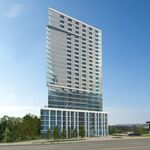Seems rather timely. This just on the web page of the Globe and Mail.
http://www.theglobeandmail.com/repo...ns-condo-boom-could-be-ending/article2264763/
Bank of Canada warns condo boom could be ending
steve ladurantaye
Globe and Mail Update
Posted on Thursday, December 8, 2011 2:54PM EST
38 comments
The Bank of Canada has a warning for condo investors – the boom times may be over.
In its December economic review, the central bank said that "certain areas" of the housing market could see prices fall as the economy weakens.
"Certain areas of the national housing market may be more vulnerable to price declines, particularly the multiple-unit segment of the market, which is showing signs of disequilibrium," the bank warned. "The supply of completed but unoccupied condominiums is elevated, which suggests a heightened risk of a correction in this market."
The Toronto market has been of particular concern to market watchers, with prices continuing to rise at the same time as a record number of new units are set to flood the market.
It's also unclear who is buying the units – those in the industry often cite foreign demand, saying that investors from afar are racing to snap up units because the city is seen as a safe place to park money.
But there are no actual statistics. Canada doesn't track foreign investment in its real estate market, leaving anyone with an anecdote licence to talk up the market.
While there has been a flurry of construction in the GTA, where most of the country's condos are built, there are signs that the market is slowing. Data released Thursday by Canada Mortgage and Housing showed the number of multiple-unit housing starts dropped by a surprising 23 per cent in November.
Urbanation, which tracks Toronto condo sales, said that 20,964 new condo units were sold in the first nine months of the year, putting the city on track for a record year regardless of any recent slowdown.
The average resale unit, meanwhile, sold for $365,161 in November, according to the Toronto Real Estate Board, 8 per cent higher than they were last year.
National Bank Financial analyst Stefane Marion said that he disagres with the idea of oversupply in the city. He said the amount of inventory currently on hand would take 19.3 months to sell, below the historical average of 26 months and well below the four-year mark set in 1990, 2007 and 2010.
While it may be true that the residential market in Canada is vulnerable to price declines in the advent of an economic slowdown, the source of the problem is more likely to come from a credit-crunch induced global recession, not the Toronto new condo market," he said.
Those in the industry don’t expect to see things slow down much in the next year.
"As a result of delayed condo launches in 2011, and due to the number of new sites rumoured and under development in the GTA, we are expecting a busy 2012 in terms of new condo launches,” said Matthew Slutsky, president of BuzzBuzzHome. “We are expecting to see some epic and mind-blowing new condominium buildings and sites coming to market in 2012, specifically centred around Toronto's Yonge Street and the 905 region.”
More Economy Lab
Economy Lab
Mario Draghi vs. Ben Bernanke: Palace guard vs. cavalry chieftain
Even in extre




